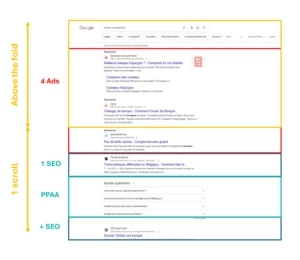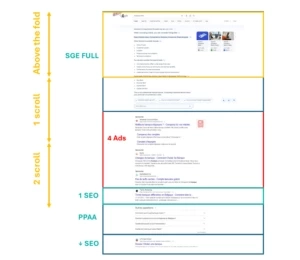Could Google SGE revolutionize the world of SEO? 2023 was clearly the year that generative AI broke through to the mainstream. It’s a safe bet that 2024 will also see AI making its mark on internet search results. Google is indeed already testing a major update, and its deployment in Europe could be imminent. The Google Search Generative Experience (SGE) integrates AI directly into the Search Engine Results Page (SERP), which could lead to significant changes in the world of search engine optimization. In this article, we will explore what we already know about the Search Generative Experience, what we do not yet know, and the anticipated impact on search results. We also provide practical advice on what marketing managers can do right now to be as prepared as possible for the launch of the Search Generative Experience.
What is Search Generative Experience (SGE)?
The Google Search Generative Experience (SGE) is Google’s response to the increasing use of AI in the field of online search. This new update aims to improve the quality of search results by using advanced AI algorithms to more precisely understand the user’s intent. As of writing (February 2024), the Search Generative Experience is currently in beta in the United States and 120 other countries, but is not yet available in Europe. However, its global release (whether in beta or not) is probably imminent, which means that marketing managers need to start preparing now.
The launch of the Search Generative Experience is set to revolutionize the search for information on the internet.
How does Search Generative Experience work?
1. Search Generative Experience results at the top of the SERP
According to the beta version currently being tested, SGE results are displayed at the very top of the SERP, before the “people also ask” section and before the organic results (SEO). The placement of advertisements remains a mystery, as they are not visible in the beta version being tested. However, it’s conceivable that they could be integrated into the SGE results, and / or positioned above the organic results. All these factors are likely to push organic results further down and inevitably make them less visible!

Without Search Generative Experience, the organic results for the query “Choosing a bank” are visible 1 scroll past the fold.

According to the beta version currently being tested, the search for “choosing a bank” first generates the Search Generative Experience result. If we assume the placement of Google Ads above the organic results, these will only be visible after 2 scrolls further down.
2. Rich responses to user queries
In much the same way as with a language model like ChatGPT, Search Generative Experience results will offer original formulation and content. Links to the sources used to generate these results are included, but sometimes require several clicks.
Search Generative Experience results respond more precisely and relevantly to the user’s question. They also better match the user’s search intent than other usual search results. For example, for a question about a historical event, Google will present the result in the form of an article. For a question with a purchasing intent, Google might offer a product comparison.

When there is a purchasing intent, SGE results offer a comparison
3. “Ask a Follow Up”: taking into account the search context
Since the Search Generative Experience is a conversational model, it keeps track of your previous searches. Because of this, the user can ask follow-up questions related to their initial query without having to repeat the search context, thus refining their search. Google itself suggests some follow-up questions, or the user can pose their own by clicking on “Ask a follow-up.”
The “Ask a Follow up” function allows continuing the search while taking into account the context from previous searches.
4. Results significantly differ depending on the sector
According to a recent analysis by Onely, SGE results are generated for nearly 79% of searched keywords. Either spontaneously (48%), or upon the user’s request (31%). In the latter case, the user must click on “show more” before seeing the Search Generative Experience results. However, there are clear differences depending on the topics and sectors:
- In finance, a search generates SGE results only in 16% of cases.
- In e-commerce, on the other hand, 93.34% of searches generate an SGE result.
Thus, it can be concluded that certain sectors, or certain types of sites, will be more impacted than others.
Opportunities and challenges of Search Generative Experience for your SEO
1. A reshuffling of the cards
The major question is how Google selects its sources for constructing its SGE results. In other terms, what algorithm underpins the Search Generative Experience results? Currently, according to Onely’s study, only about half of the Search Generative Experience results are based on a source that is presently in the top 10 of organic searches. Thus, one could view this situation as either half empty or half full:
- The pessimistic view: The SGE could significantly disrupt your site’s SEO, heralding a period of uncertainty. Sites that are well-positioned today might face significant challenges tomorrow.
- The optimistic view: This redefinition of the rules could also unveil precious opportunities. Pages that did not rank well before might now appear in the SGE results. This means that positions which were once hard to reach, with strong competition and often occupied by large players, might become accessible, especially to smaller entities that are highly relevant to the subject.
2. Flexibility and responsiveness as key principles
In any case, the launch of Search Generative Experience in Europe will likely be followed by a period of instability and variability in search results, lasting for a shorter or longer period. We can indeed expect reactions and adaptations from market players, as well as constant adjustments to the algorithm from Google.
It’s highly likely that Search Generative Experience will dominate many conversations within the marketing teams of e-commerce actors in particular. These actors will need to allocate additional resources to enhance their monitoring capabilities and adjust their strategies accordingly.
3. The (long-awaited) rise of Voice search: is it finally here?
It has long been predicted that voice search would breakthrough, yet it hasn’t happened so far. However, this could change. Firstly, because voice works very well with Chat GPT and Bing conversation, introducing new interaction habits for users with web interfaces. Secondly, the arrival of Search Generative Experience involves conversational-type searches, and voice is well-suited for it!
It’s indeed easier to ask orally, “Can you tell me where to buy a XY brand sofa near me?” than having to orally formulate a classic query like “XY brand sofa seller Auderghem.” By integrating conversational mode into search, voice search will become much more natural.
The impact on SEO? Traditional Google search, written, ultimately relies on fairly formatted keywords or keyword combinations. However, we can expect a much greater variation in queries and keywords from voice searches – and probably conversational-type queries in general. This thus multiplies the number of positioning opportunities.
How to prepare for the arrival of Search Generative Experience and its impact?
Indeed, there are still many uncertainties regarding how the Search Generative Experience algorithm will operate, or the fate of advertisements. But as always in SEO, rather than scattering or relying on speculation, it’s preferable to allocate your budget to reliable SEO strategies, which will also pay off in SGE:
1. Prepare dashboards for close monitoring
Start creating your dashboards now using data from Google Search Console to track fluctuations in impressions and clicks across different search categories. This will allow you to measure the impact of Search Generative Experience on your site and adjust your strategy accordingly. Expect that click and impression data from SGE will appear in your Google Search Console. Anticipate frequent fluctuations in search results as Google continues to experiment with SGE. Be prepared to adjust your strategy accordingly.
At Universem, we configure dashboards that retrieve data from multiple tools such as Google Search Console, Google Analytics, as well as SERanking or Screamingfrog. We also configure visualization in Google Data Studio.
Furthermore, we can assist you in understanding certain variations. For example, your impressions may remain stable, but the click-through rate could decrease because the user finds the information they need directly within the Google environment. If your brand remains visible there (for example, in a “brand” search), you lose nothing! However, in the case of a generic search, your brand might be invisible in the SGE result. Without clicks to your site, the shared information won’t directly benefit you anymore!
2. Take Care of Your Structured Data
Structured data helps search engines understand the content of your website more precisely. Search Generative Experience particularly relies on it, so it becomes a must-have! Ensure that your structured data is properly implemented for all relevant pages of your site. This includes appropriate Schema.org tags to describe your products, services, reviews, and other relevant elements.
Structured data strategy will be particularly crucial for products, as Search Generative Experience heavily relies on product comparison. It will also be very useful for the visibility of your blog: therefore, consider referencing author information, date, mentions, reading time, summary, etc.
3. Think “Conversational” and “Search Intent”
Start thinking about the different questions users might ask about your products and services and their conversational formulation. Then, develop content to answer them. This exercise was already relevant for SEO in general and for obtaining position zero; it will be even more so with SGE. Also, continue to focus your content on the user’s search intent, an increasingly important criterion with each evolution of Google’s algorithm.
4. Be prepared
Start allocating resources in terms of time, personnel, or budget to respond to changes as soon as they occur.
5. Get help from experts
At Universem, we are ready to help you sharpen your tools and strategies to face what promises to be one of the biggest changes in the world of SEO!

